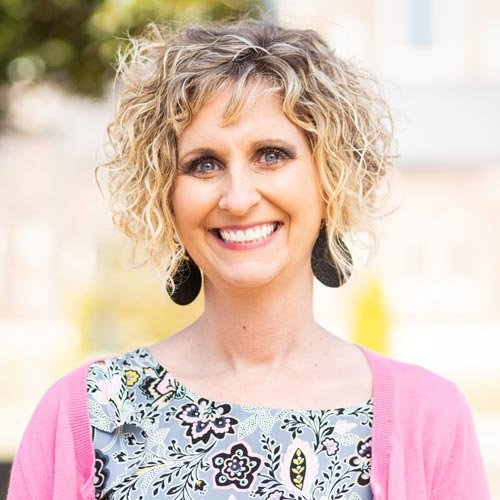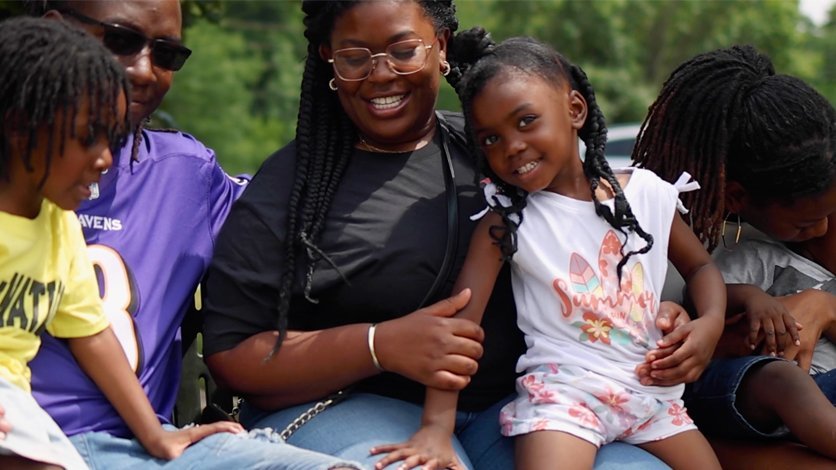Counseling, M.A.
Transform your future. Make a difference in the lives of others.
The CACREP-accredited Master of Arts in Counseling program offers you a rich and diverse learning experience that prepares you for opportunities in a wide array of professional counseling settings.
Lenoir-Rhyne offers two CACREP-accredited 61-credit hour programs of study in Clinical Mental Health Counseling or School Counseling. Students in the degree program have the opportunity to take additional coursework from the two programs of study to meet the educational requirements for state licensure in North Carolina as a Clinical Mental Health Counselor or School Counselor. Applicants should note that this is not considered a dual-degree program and does not take the place of the educational and clinical experiences of a full program of study, but provides some additional educational opportunities.
Lenoir-Rhyne sustains longstanding clinical community partnerships in both programs, providing you with vibrant internship and practicum experiences. Our counseling faculty bring years of real-world experience to students seeking to become clinical mental health or school counselors.
Request Information
Take the next step toward completing your Masters in Counseling degree at Lenoir-Rhyne University.
Get StartedTake the next step toward completing your Masters in Counseling degree at Lenoir-Rhyne University.
"The program has provided me with practical experience through a practicum and internship, feedback from faculty and classmates, which has made me feel very confident and prepared for the counseling profession."
Designed for Working Professionals

You may take classes at your own pace as a full-time or part-time student. Classes are offered through our Hickory and Asheville campuses. Some classes may also be offered in an online or hybrid format.
You may begin program studies any semester—summer, fall or spring term. Although students are allowed to enter the program in the summer semester, course selection will be limited due to prerequisite introductory courses that are not available until the fall semester.
Experience Professional & Personal Growth
The journey toward becoming a professional counselor is a rewarding one, ripe with opportunities for personal growth and professional development. Most graduates of counseling programs find that the training process transforms their own lives even as they are learning to be change agents in the lives of others.
Challenge Yourself
You will be introduced to new theoretical frameworks and ways of understanding human behavior. You will be challenged to examine your biases and reflect upon how your life experiences affect your work with clients. You will be asked to step outside your comfort zone as you practice new skills and explore new perspectives. And throughout the program, you will be supported as you develop your personal style of counseling.
In counseling, a master’s degree is the terminal degree to practice independently. Our program prepares students with a strong foundation in clinical skills training. Lenoir-Rhyne offers several skills-based classes, including advanced techniques, practicum and two semesters of internship.

My internship experience at local non-profits provided valuable hands-on experience and helped me grow both personally and professionally.
Program Overview
-
Program Mission, Purpose and Diversity Statement
Program Mission
The faculty of the Counseling Degree Program is dedicated to educating and training counseling professionals to function in culturally diverse settings. We recognize the need to address the economic, educational, and social inequalities that prevail in our communities.
The program acknowledges a commitment both to the students who will pursue preparation as professional counselors and to the larger public served by our graduates, for whom we all share a responsibility. It is due to this commitment that the faculty members hold high standards in the process of training professional counselors in school and community settings.
The programs are designed to provide a challenging, yet supportive environment that promotes professional orientation, development of a counseling identity, ethical practice, commitment to inquiry, and self-awareness. As a result, we expect our students to develop a commitment of service to others, and to the pursuit of excellence in the counseling profession.
Purpose
The Master of Arts degree in counseling is designed to prepare individuals for positions as professional counselors in agencies and/or school settings. The counseling program places primary emphasis on the development of strong ethical clinical skills.
Upon receiving the Master of Arts degree in counseling, students will meet course work requirements for eligibility to take the examination to become a National Certified Counselor (NCC) and apply to become a Licensed Professional Clinical Mental Health Counselor Associate (LCMHC-A) in the state of North Carolina and a Licensed Professional Counselor Associate (LPC-A) in the state of South Carolina.
Students satisfactorily completing the School Counseling program requirements and receiving a passing score on the PRAXIS specialty examination will be eligible for licensure as a school counselor in North Carolina.
Diversity Statement
The Counseling faculty of Lenoir-Rhyne University is committed to diversity in all areas of the program. The goal of the Counseling program is to recruit students from diverse backgrounds and those from traditionally under-represented groups in the counseling profession. As such, in policy and practice, the Counseling faculty seek to recruit, admit, and retain a diverse student body. The Counseling faculty is dedicated to educating and training counseling professionals to function in culturally diverse settings and embody the Multicultural Counseling Competencies of the American Counseling Association.
The curriculum is designed to challenge students to reflect on the ways in which personal bias, privilege, and culture impact the therapeutic relationship and process. The faculty have made a commitment to integrate issues related to multicultural counseling (awareness, knowledge, and skills) and diversity throughout the curriculum, and syllabi are reviewed routinely to ensure that this commitment is being met.
As a faculty, we are committed to an inclusive and anti-racist learning environment. The coursework in this program includes materials and discussions that will challenge personal ideas on oppressive and unjust forces that exist in our communities. As an anti-racist community, we will strive to identify, discuss, and challenge issues of race, color, ethnicity, and the impacts they have on students, faculty, and staff members.
It is expected that all students engage in these difficult and sometimes uncomfortable conversations with respect, courage, and compassion. It is expected that we treat each other with kindness and respect when differences of belief, values, or experiences arise within classroom discussions, group work, or learning materials. As we navigate difficult and uncomfortable topics, disrespect for others’ background and their experiences will not be tolerated within the Counseling Program.
-
Program Objectives
Lenoir-Rhyne University Counseling Program Objectives
- Students will develop strong professional identities as counselors. Students will gain foundational knowledge related to legal and ethical principles, codes, and decision-making processes.
- Students will gain awareness of their own cultural identity, including privilege, oppression, and biases, and how it influences counseling relationships. Students will gain knowledge of multicultural theories and counseling practices in order to be culturally competent counselors.
- Students will learn various theories of human development in order to integrate a developmentally and culturally appropriate approach to working with a wide range of diverse clients.
- Students will understand various career counseling theories in order to conceptualize career development across the lifespan, including how career concerns influence mental health concerns. Students will integrate knowledge related to cultural and ethical competencies to provide effective career counseling strategies.
- Students will learn the foundational elements of counseling theories and techniques that are needed to foster movement towards clients' goals through effective use of helping skills, theoretical conceptualizations, and related interventions.
- Students will attain the foundational knowledge and skills required for effective facilitation of group counseling.
- Students will learn to utilize assessment and testing throughout the counseling relationship. Students will gain an understanding of the assessment process in order to integrate assessment results into client conceptualization and treatment.
- Students will gain knowledge related to the principles of ethical and effective research methods for counselors; in particular, an understanding of how to use counseling research to inform counseling practice and direct future research for the field at large.
Clinical Mental Health:
- Students will gain a comprehensive understanding of clinical mental health counseling practices, including advocacy, prevention, and treatment for a broad range of mental health concerns.
School Counseling:
- Students will gain an understanding of the various roles and responsibilities of school counselors, including leadership, advocacy, and consultation necessary to develop and implement a comprehensive school counseling program.
Program Requirements
Offered in Hickory and Asheville
The Lenoir-Rhyne master of arts degree in counseling is designed to prepare individuals for positions as professional counselors in agencies and/or school settings. Students have the opportunity to take courses on any of our three campuses. The curriculum at all three sites is identical, and students will have the opportunity to interact with the LR faculty based on each campus. The counseling program places primary emphasis on the development of strong clinical skills. Upon receiving the master of arts degree in counseling, students will meet the educational requirements for eligibility to apply to become a National Board Certified Counselor (NCC), and Licensed Clinical Mental Health Counselor (LCMHC) in North Carolina, or Licensed Professional Counselor (LPC) in South Carolina. Students satisfactorily completing the school counseling program requirements and receiving a passing score on the PRAXIS specialty examination will be eligible for licensure as a school counselor in North Carolina.
The master's degree is the entry-level degree for persons entering the counseling field. The counseling course of study is designed to begin during the fall or spring semester. Although students are allowed to enter the program in the summer semester, course selection will be limited due to prerequisite introductory courses that are not available until the fall semester.
All students in the counseling program must have in effect counselor liability insurance through the American Counseling Association Insurance Trust during the time they are enrolled in the counseling program. In addition, students are required to purchase a subscription to Tevera, the counseling portfolio management system. The one-time subscription cost for Tevera is included in the first semester charges. Any counseling practicum/intern receiving a grade lower than a B/3.0 in a practicum/internship will not be recommended for state licensure or National Board Certification.
Comprehensive Examination
Students are required to pass a two-part comprehensive examination. First, students must complete a nationally standardized exam (CPCE) that measures competency across the eight core areas of counseling. Students must pass this examination prior to internship. Students who fail this examination may be required to do remediation, additional coursework and/or assignments and re-test. Students who fail subsequent re-tests may be dismissed from the program. The second part of the examination (Specialty Capstone Project) requires a written, comprehensive assessment of the specific program of study. This capstone project is completed during internship. Students who fail this assessment will not be permitted to graduate.
-
School Counseling (61 Credit Hours)
- COU 505 - Counseling Theories
- COU 506 - Child, Individual, & Family Development
- COU 510 - Introduction & Foundation of School Counseling
- COU 515 - Advanced School Counseling
- COU 516 - School Counseling and Special Education
- COU 524 - Psychological and Educational Testing and Appraisal
- COU 525 - Professional Orientation and Ethical Practices
- COU 530 - Counseling Techniques
- COU 535 - Diversity Issues for the Helping Professional
- COU 540 - Group Counseling
- COU 542 - Research and Statistical Methods
- COU 545 - Career Counseling
- COU 549 - Addictions Counseling
- COU 550 - Psychopathology, Diagnosis, & Treatment Planning
- COU 555 - Consultation Processes and Crisis Intervention
- COU 560 - Couple and Family Counseling
- COU 580 - Practicum in School Counseling
- COU 590 - Internship in School Counseling I (300)
- COU 591 - Internship in School Counseling II (300)
- ELECTIVE (selected under advisement) 3 Credits.
-
Clinical Mental Health Counseling (61 Credit Hours)
- COU 505 - Counseling Theories
- COU 506 - Child, Individual, & Family Development
- COU 520 - Clinical Mental Health Counseling
- COU 524 - Psychological and Educational Testing and Appraisal
- COU 525 - Professional Orientation and Ethical Practices
- COU 530 - Counseling Techniques
- COU 535 - Diversity Issues for the Helping Professional
- COU 540 - Group Counseling
- COU 542 - Research and Statistical Methods
- COU 545 - Career Counseling
- COU 549 - Addictions Counseling
- COU 550 - Psychopathology, Diagnosis, & Treatment Planning
- COU 555 - Consultation Processes and Crisis Intervention
- COU 560 - Couple and Family Counseling
- COU 566 - Advanced Counseling Techniques, Diagnosis, and Treatment Planning
- COU 585 - Practicum in Clinical Mental Health Counseling
- COU 592 - Internship in Clinical Mental Health Counseling I (300)
- COU 593 - Internship in Clinical Mental Health Counseling II (300)
- ELECTIVES (selected under advisement) 6 credits
Counselor Examination & Licensure
We are committed to developing professional counselors to work effectively and ethically with diverse clients in a variety of settings, including PreK-12 schools, colleges and universities, community mental health centers, hospitals, as well as private practice and social services agencies.
Upon receiving a Master of Arts in Counseling degree, students meet coursework requirements for eligibility to take the examination to become a National Certified Counselor (NCC) and Licensed Clinical Mental Health Counselor (LCMHC) in North Carolina and South Carolina. Students satisfactorily completing the School Counseling program requirements and receiving a passing score on the PRAXIS specialty examination are eligible for licensure as a school counselor in North Carolina.
Career Paths
Clinical Mental Health Counselors
- Counselor work settings may include: community agencies, hospitals, private practice, residential treatment centers, government agencies, VA, and faith-based organizations.
- Trained to work with individuals, families, couples, and groups.
- Trained in assessment, diagnosis, and treatment of mental disorders as well as helping clients struggling with normal, developmental issues, and life transitions. Help clients work toward personal goals and holistic wellness.
School Counselors
- School counselors work in either elementary, middle, or high school settings. School counselors develop and implement comprehensive school counseling programs (through the ASCA National Model) to support students in their academic, social/emotional, and vocational career development. School counselors wear many different hats and serve as liaisons between students, teachers, administrators, and parents.
Program & Student Outcomes
From summer 2024 to spring 2025, 93% of alumni respondents were employed as a licensed counselor within six months of graduation and more than 96% were licensed as either a school counselor or clinical mental health counselor.
View Annual StatisticsGraduate Admission & Financial Aid
-
Connect with UsWe offer regular virtual information sessions via Zoom so watch our calendar for upcoming sessions. Or reach out directly to a graduate enrollment counselor for assistance.
-
ApplyWith your convenience in mind, we have outlined a step-by-step process that should assist you in submitting your application and supporting documentation — and we are here to answer any questions.
-
Admission CounselorsThe Graduate School admission team is here to talk one-on-one with prospective students to help you make your enrollment as easy as possible. Our counselors will provide the information and guidance you need to submit your application, apply for financial aid, visit and learn more about the many opportunities available to new students.


